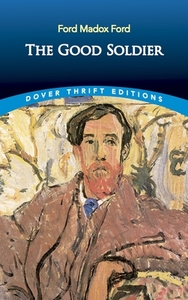Take a photo of a barcode or cover
There is so much to say about this book! I’ll start by gushing about the narration — rambling, time-jumping, and relayed by an unreliable narrator whose shifting accounts and mixing up of dates further complicated the storytelling while providing a sense of mystery. His storytelling amplified the tragedy of the tale he told — all the while heavily influencing its delivery: a tale of passion told by a narrator incapable of passion.
I felt this story to be reminiscent of three of my favorite tragedies: wuthering heights, Ethan Frome, and Tess of the D’Urbervilles, all of which present the core of the tragedy quite early in the book while the author allows the rest of the story to slowly unfold, providing the how”, “why”, “when” at their leisure.
The same quality that made this book so good is what made it hard to ease into — I found the beginning confusing, with its almost haphazard presentation. Reading this book in large chunks became a necessity, it is not the type for picking off a few pages at a time.
To summarize — an excellent tragedy with a stunning narrative style and a generally amoral and reprehensible cast of characters, all of whom are unhappy. Sort of my jam :)
-Read in 2020-
I felt this story to be reminiscent of three of my favorite tragedies: wuthering heights, Ethan Frome, and Tess of the D’Urbervilles, all of which present the core of the tragedy quite early in the book while the author allows the rest of the story to slowly unfold, providing the how”, “why”, “when” at their leisure.
The same quality that made this book so good is what made it hard to ease into — I found the beginning confusing, with its almost haphazard presentation. Reading this book in large chunks became a necessity, it is not the type for picking off a few pages at a time.
To summarize — an excellent tragedy with a stunning narrative style and a generally amoral and reprehensible cast of characters, all of whom are unhappy. Sort of my jam :)
-Read in 2020-
emotional
informative
reflective
slow-paced
Plot or Character Driven:
Character
Strong character development:
Yes
Loveable characters:
Complicated
Diverse cast of characters:
No
Flaws of characters a main focus:
Yes
This is a sneaky one. At some points, it seems so disjointed that it takes a minute for one to grasp the thread: a tragedy of living by expectations. Can see why people reread this even with nobody to like and a story of nothing but dashed hopes and comeuppances.
dark
emotional
reflective
sad
medium-paced
Plot or Character Driven:
Character
Strong character development:
Yes
Loveable characters:
Complicated
Diverse cast of characters:
No
Flaws of characters a main focus:
Yes
Moderate: Suicide
luvpyrs.wordpress.com/2017/11/14/review-the-good-soldier-by-ford-madox-ford/
The Good Soldier was not what I was expecting. You hear about a book centered around adultery, but written in 1915, you don't really imagine this kind of book. I thought I was walking into something about how terrible it is to be cheated on, or how the narrator's tart of a wife catches some sort of lady disease from her lover (read: chlamydia). Instead what I got was an intensely psychological tale about an affair and the aftermath that does a good job of showing the nuance of the situation in a subtle yet meaningful way.
The narrator, John Dowell, tells the story in a fragmented way, bouncing back and forth through time from the moment he and his wife Florence met the Ashburnhams, to the end of their friendship many years later. The way he tells it, Florence comes across as bored and careless, falling into the arms of her friend's husband without thought of how anyone else would feel. Later, she becomes almost sadistic in her flaunting of the relationship, even going so far as to openly engage in it in front of Edward Ashbunham's wife Leonora. She becomes so incredibly unlikable that one can't help but have sympathy for her poor cuckold husband.
However, as the story continues, we see hints that John is not everything he presents himself to be. In one particularly telling scene, he beats his black servant for dropping his suitcase, frightening Florence. This shows that despite his mild, meek persona, John Dowell has a darkness in him that he's not showing us. That combined with the frankly disrespectful way that he speaks about Florence tells the reader in no uncertain terms that this is John's version of events - and that it is very, very biased.
Leonora, the other wronged party in the whole situation, is amazing. Whereas John is an oblivious dullard, Leonora is fierce and more than aware of what her husband does behind her back. Without spoiling too much, despite the pain that she endures throughout her marriage, Leonora comes out of the situation much better off than any other party. She is awesome.
5/5.
The narrator, John Dowell, tells the story in a fragmented way, bouncing back and forth through time from the moment he and his wife Florence met the Ashburnhams, to the end of their friendship many years later. The way he tells it, Florence comes across as bored and careless, falling into the arms of her friend's husband without thought of how anyone else would feel. Later, she becomes almost sadistic in her flaunting of the relationship, even going so far as to openly engage in it in front of Edward Ashbunham's wife Leonora. She becomes so incredibly unlikable that one can't help but have sympathy for her poor cuckold husband.
However, as the story continues, we see hints that John is not everything he presents himself to be. In one particularly telling scene, he beats his black servant for dropping his suitcase, frightening Florence. This shows that despite his mild, meek persona, John Dowell has a darkness in him that he's not showing us. That combined with the frankly disrespectful way that he speaks about Florence tells the reader in no uncertain terms that this is John's version of events - and that it is very, very biased.
Leonora, the other wronged party in the whole situation, is amazing. Whereas John is an oblivious dullard, Leonora is fierce and more than aware of what her husband does behind her back. Without spoiling too much, despite the pain that she endures throughout her marriage, Leonora comes out of the situation much better off than any other party. She is awesome.
5/5.
I thought Ford digressed too often and telegraphed the story too often. I thought it was strange how he introduced Nancy Rufford so late in the book, and although the narrator said he loved her, there weren't any depictions of why.
I found this book on the guest house in Copenhagen's bookshelf. I was pulled in and couldn't put it down despite the fact I was on vacation. Really a wonderful book that makes you think about your perceptions of other people and how foolish you can be when you are in love.
Dull and disappointing. None of the characters are likeable or hold any interest.
Ford takes what could be a mundane story about infidelity and restrictive social customs and turns it into something psychologically gripping with uncommonly good insights and deep characterization. The first half is especially well done.





